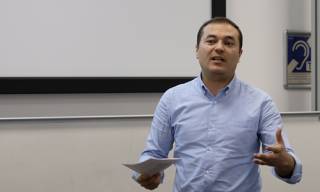Akbarjon graduated from our Development, Technology and Innovation Policy in 2019. He now works as a Grants Manager for the World Bank's Modernizing Uzbekistan National Innovation System Project.

Prior to my studies at UCL, I had been working for the Uzbekistan Academy of Science - the biggest technology and innovations producer of the country - for six years and I wanted to further develop my professional and academic knowledge in order to gain a better understanding of what I was doing. This led me on a journey to explore new theoretical and practical aspects of STI policymaking. During my selection process, STEaPP naturally rose to the top due its interdisciplinary approach and real-world based research.
What was your favourite aspect of your course?
Two things stand out to me. Firstly, the teaching staff at the department have extensive industry experience prior to becoming academics and they have a great understanding of what works and doesn't in real life when it comes to policymaking. Secondly, the MPA Group Project was an amazing benefit. We had an opportunity to work with the Prime Minister's Office in the UAE on a policy research project looking into an important development issue in their country. This allowed us to apply our newly learned skills and knowledge to an actual policy problem.
What did you enjoy most about studying in London?
Again two things to assert: one is how diverse the city is that you feel both at home and anywhere in the world at the same time. The other one is enriching networking opportuinities. London's green parks are just delightful bonuses.
Please provide your current job title and the name of your organisation.
Grants Manager, The World Bank's Modernizing Uzbekistan National Innovation System Project (MUNIS).
Please provide a brief summary of your role and the skills that you use.
Within the MUNIS project we have several programmes aiming to address different pillars of national innovation system. Our research excellence programme, a competitive research grant program, is the most important one. It finances several selection rounds of research projects under strict selection and monitoring processes, and I am a Grants Manager for this program.
My role as a Grants Manager is to ensure the successful implementation of grant projects by researching, monitoring, and evaluating new and existing grants while ensuring compliance with all applicable regulations of the World Bank. Additionally, I coordinate with other staff members to provide timely progress reports on ongoing projects and review upcoming grant opportunities for the organisation. My main priority is always ensuring our programs remain fiscally viable while providing maximum benefit to those we are serving. My managing grants portfolio is currently 10,0 million USD which is projected to grow to 17,0 million after upcoming selection rounds.
How has your degree at STEaPP shaped your experiences since leaving UCL?
My degree at STEaPP has been immensely helpful since leaving UCL. I have a much better understanding of the systems and structures of government policies, which has enabled me to expand my professional network and made it easier to speak with policy makers who respect the technical knowledge that I received throughout my studies. Moreover, STEaPP also taught me valuable practical skills, such as how to analyse different public policy contexts carefully and create effective solutions tailored to them.
What advice would you give to current or prospective students?
My advice to current and prospective students of STEaPP at UCL would be to take full advantage of the diversity and expertise of faculty, staff, and other students from around the world. You will be exposed to new ideas and perspectives that can help you think more critically about the policy challenges facing societies today. Additionally, find ways to apply your coursework to real-world situations so that you may be better prepared for a career in policy. Finally, ask questions, get involved in extracurricular activities and attend events related to STEaPP so that you have many opportunities for networking and connecting with people who can help you throughout your studies.
 Close
Close

